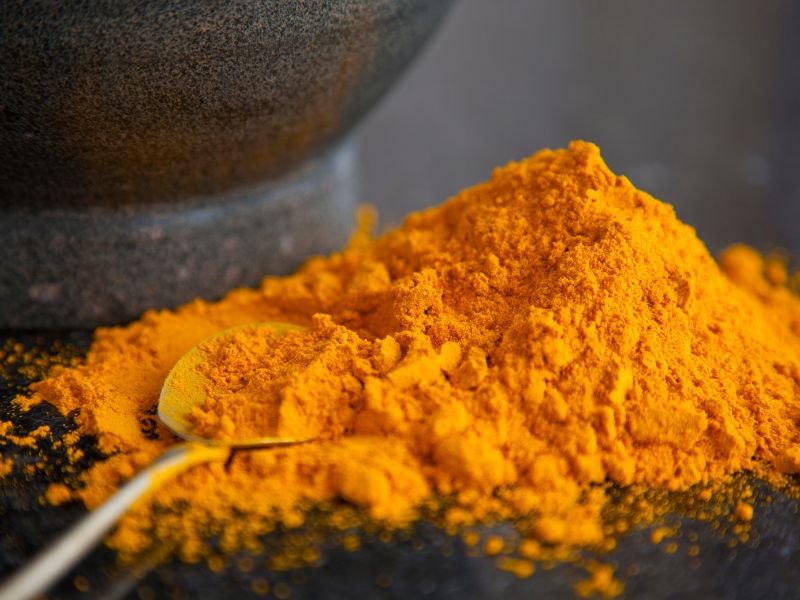Turmeric extract is one of the most popular health supplements, and for good reason, but this golden spice doesn’t only come as a standalone product. You can find turmeric extract in supplements for arthritis, gout, and different aspects of gut health. This post will use scientific evidence to explain how turmeric influences gut health, why you should use turmeric for leaky gut, and how this spice contributes to the efficacy of our leaky gut supplement, Gutsyl™.
What Is Turmeric Extract And How Does It Work?
Turmeric has been used for centuries for its anti-inflammatory, antioxidant, and antimicrobial properties. This spice is derived from the root of the turmeric plant, which is a part of the ginger family. Curcumin is the main active ingredient in turmeric, and it is responsible for the health benefits of this spice, as well as its color. This yellow compound has been shown to modulate inflammation, oxidative stress, and immune response (1).
Curcumin can also interact with the gut microbiota, which is the collection of bacteria, fungi, and other microorganisms that live in the digestive tract. The gut microbiota plays a crucial role in maintaining the health and function of the gut barrier, which is the layer of cells and mucus that separates the gut from the rest of the body. The gut barrier prevents the leakage of toxins, pathogens, and undigested food particles into the bloodstream, where they can trigger inflammation and immune reactions (2).
What Is Leaky Gut And How Does It Affect Your Health?
Leaky gut, also known as intestinal permeability, is a condition in which the gut barrier is damaged and allows the passage of harmful substances into the bloodstream. This condition can be caused by various factors, such as stress, diet, medication, infection, and environmental toxins (3). Additionally, it can cause other health conditions. Leaky gut is linked to the development of various health complications (4), such as:
- Chronic inflammation, which in turn can contribute to the development of autoimmune diseases, such as rheumatoid arthritis, type 1 diabetes, and multiple sclerosis (5).
- Food allergies and intolerances, which can cause symptoms such as gas and bloating, diarrhea, and skin rashes (6).
- Irritable bowel syndrome (IBS), which is a common disorder that affects the large intestine and causes abdominal pain, cramping, constipation, and diarrhea (7).
- Inflammatory bowel disease (IBD), which is a group of chronic conditions that affect the lining of the digestive tract and cause inflammation, ulcers, and bleeding. The two main types of IBD are Crohn’s disease and ulcerative colitis (8).
- Metabolic syndrome, which is a cluster of risk factors that increase the chances of developing cardiovascular disease and type 2 diabetes. These risk factors include high blood pressure, high blood sugar, high triglycerides, low HDL cholesterol, and abdominal obesity (9).
How Can Turmeric Extract Help With Leaky Gut?
Research has shown that Curcumin can help maintain the integrity of the intestinal barrier. In a study by Wang and Ghosh et al., it was found that Curcumin can attenuate the release of gut bacteria-derived lipopolysaccharide (LPS) into circulation (10). LPS is known to cause chronic inflammation, which is a common characteristic of metabolic diseases such as type 2 diabetes and atherosclerosis (10).
Curcumin achieves this by modulating the function of intestinal epithelial cells, which are crucial for maintaining the intestinal barrier (10). Specifically, Curcumin was found to reduce the secretion of the cytokine IL-1β, which is known to disrupt the normal arrangement of tight junction proteins in the intestinal barrier (10).
In another study by Ghosh et al., it was further established that despite its poor bioavailability, Curcumin can beneficially modulate diseases by maintaining the integrity of the intestinal barrier (11). This suggests that the beneficial effects of Curcumin are not necessarily dependent on its absorption into the body (11).
In conclusion, the Curcumin in Turmeric can help with leaky gut by maintaining the integrity of the intestinal barrier and reducing chronic inflammation. However, more research is needed to fully understand the mechanisms involved and to determine the optimal dosage and method of administration of Curcumin for this purpose.
How Does Turmeric Contribute To The Efficacy Of Gutsyl™, The Leaky Gut Supplement?
In the case of Gutsyl™, Turmeric is combined with a synergistic blend of ingredients designed to maximize gut health. Each component of Gutsyl™ serves to complement Turmeric’s benefits, forming a robust defense against the increased intestinal permeability.
The inclusion of MicrobiSci™, an antimicrobial complex with Berberine HCL and BioPerine®, enhances the anti-inflammatory and antibacterial action, ensuring a rapid response to gut distress. The formula also boasts a range of vitamins, including Vitamin C and D3, both of which play pivotal roles in immune function and gut healing. Additionally, L-glutamine HCL, an essential amino acid, aids in repairing intestinal cells, while Zinc bolsters the immune system and restores gut lining.
Gutsyl™ also contains prebiotics such as Acacia Gum to not only support anti-inflammatory responses but also promote a healthy balance of gut flora. Licorice Extract adds to the anti-inflammatory effects of Gutsyl™ and provides its own set of antibacterial and antiviral properties. Additionally, Aloe Vera and Marshmallow Root provide soothing relief to the stomach and intestines, with mucilage forming a protective layer that is key in managing leaky gut. Lastly, Quercetin and Slippery Elm Bark further enhance intestinal barrier function, with flavonoids and mucilage properties that not only reduce inflammation but also help to maintain the integrity of the gut lining.
By integrating Turmeric into Gutsyl™, the supplement offers a comprehensive approach to managing leaky gut syndrome. The thoughtful combination of ingredients works in harmony to protect the digestive tract, alleviate symptoms, and ultimately, provide a pathway to better overall health.

